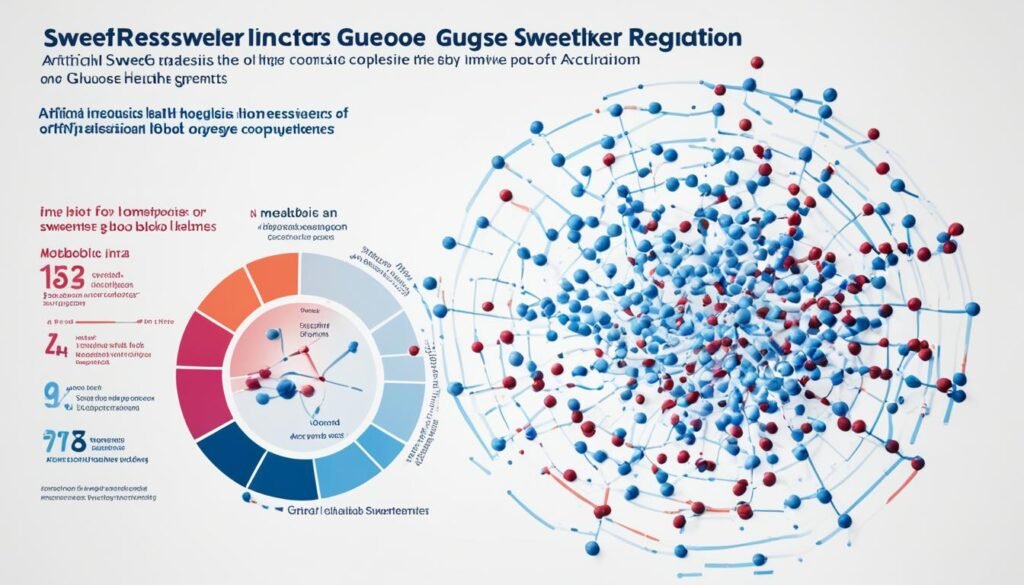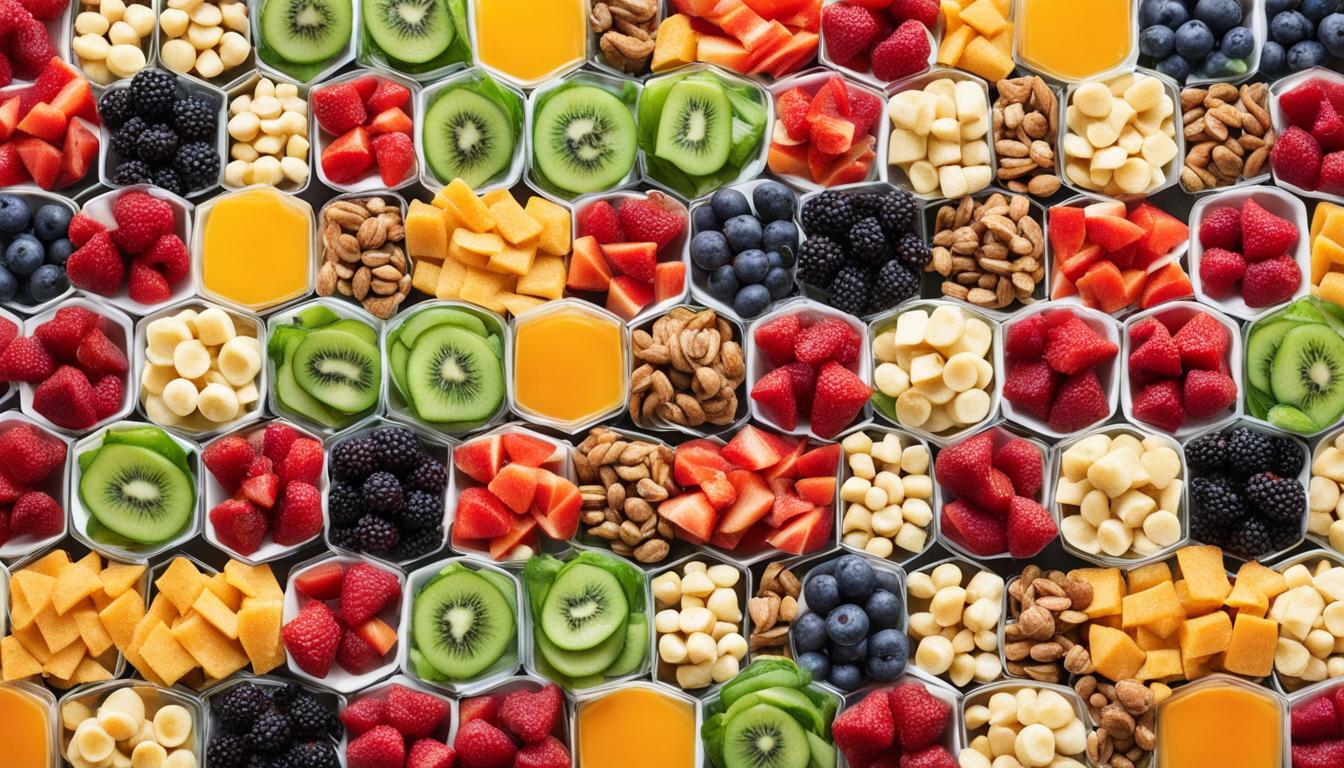I’m here to share important information about managing your weight through sugar intake limits. It’s no secret that excessive sugar consumption can contribute to weight gain, obesity, type 2 diabetes, and heart disease. To maintain a healthy weight and reduce the risk of these health problems, it’s crucial to control your sugar intake.
According to the Dietary Guidelines for Americans, individuals over the age of 2 should limit their sugar intake to less than 10% of their daily caloric intake. For example, if you consume 2,000 calories a day, no more than 200 calories should come from added sugars. By following these guidelines, you can effectively manage your weight and prioritize your health.
Now, let’s dive deeper into understanding added sugars and how to make healthier choices to limit your sugar intake. With the right knowledge and strategies, you can take control of your weight and overall well-being.
Key Takeaways:
- Limiting sugar intake is crucial for weight control and overall health.
- Follow the Dietary Guidelines for Americans and keep added sugar consumption below 10% of your total daily calories.
- Added sugars can be found in various food products, so it’s important to check ingredient labels.
- Reduce or eliminate sugary drinks from your diet to support weight loss efforts.
- Making healthier food choices and opting for natural sweetness from fruits can help in managing sugar intake.
Understanding Added Sugars
Added sugars are sugars and syrups that are added to foods or beverages during processing or preparation. Consuming too many added sugars can contribute to weight gain and obesity, as well as increase the risk of type 2 diabetes and heart disease.
It is important to be aware of the different names of added sugars when reading food labels. Examples of added sugars include:
- Brown sugar
- Corn syrup
- Fructose
- High-fructose corn syrup
- Honey
- Sucrose
When these added sugars are consumed in excess, they can have detrimental effects on health. For example, high sugar intake has been linked to:
- Weight gain and obesity
- Type 2 diabetes
- Heart disease
To make informed choices about the foods we consume, it is crucial to check food labels for the presence of added sugars and be familiar with their different names. Being mindful of added sugar intake is an important step towards managing weight and promoting overall health.
Sugar Intake Guidelines

The Dietary Guidelines for Americans provide recommendations for sugar intake to maintain a healthy weight and minimize the risk of health problems related to excessive sugar consumption. It is advisable for individuals over the age of 2 to limit their daily sugar consumption to less than 10% of their total caloric intake. For instance, if an adult follows a 2,000-calorie diet, the recommended sugar limit would be 200 calories from added sugars.
To further put this into perspective, adhering to the sugar intake guidelines means keeping your added sugar consumption below the recommended limit in order to maintain a healthy weight and overall well-being. By following these guidelines, you reduce the chances of weight gain, obesity, type 2 diabetes, and heart disease that can result from excessive sugar intake.
| Caloric Intake | Sugar Limit |
|---|---|
| 1,500 | 150 calories from added sugars |
| 2,000 | 200 calories from added sugars |
| 2,500 | 250 calories from added sugars |
Following these sugar intake guidelines provides a framework for managing your weight effectively while still enjoying a balanced diet. When it comes to maintaining a healthy weight, it is crucial to be mindful of the added sugars in your daily food choices and make informed decisions that align with the recommended sugar limits.
By monitoring your sugar intake and making conscious choices to limit added sugars, you can sustain a healthy weight and reduce the potential health risks associated with excessive sugar consumption. Paying attention to the recommended sugar intake guidelines is an essential step towards achieving and maintaining a healthy lifestyle.
Sugary Drinks and Weight Control
Sugary drinks are a major concern when it comes to managing sugar intake for weight control. These beverages are the leading source of added sugars in the American diet, contributing to weight gain and obesity. Consuming sugary drinks regularly can have detrimental effects on overall health.
To support weight loss efforts and reduce sugar consumption, it is crucial to minimize or eliminate the consumption of sugary drinks. Instead, opt for healthier alternatives like water or beverages with no added sugars. By making this simple switch, you can take a significant step towards managing your weight effectively without compromising your health.
Reducing sugary drink consumption not only helps in weight control but also promotes better overall health. Instead of reaching for a soda or sweetened juice, try incorporating refreshing alternatives like infused water, unsweetened tea, or sparkling water infused with citrus fruits. These alternatives provide hydration without the excess calories and added sugars found in sugary drinks.
Healthier Options to Limit Sugar Intake

When it comes to managing sugar intake, making healthier food choices is key. By opting for foods and drinks that are low in added sugars, you can reduce your overall sugar consumption without sacrificing taste or enjoyment.
One smart food choice is to replace traditional desserts like cookies or cakes with fresh fruits. Fruits provide natural sweetness along with valuable nutrients, making them a healthier option for satisfying your sweet tooth.
Another way to limit sugar intake is to choose unsweetened cereals and pair them with fresh fruit for added flavor. This allows you to maintain the enjoyment of a breakfast staple while reducing the added sugars typically found in sugary cereals.
When it comes to beverages, opting for water or low-fat milk instead of sodas is a great way to reduce added sugar consumption. Sodas and other sugary drinks are often loaded with added sugars, making them a major contributor to excessive sugar intake.
With these simple changes, you can make a significant impact on your sugar intake without compromising on taste or satisfaction. By choosing healthier options, you can enjoy a balanced diet and reduce the risks associated with excessive sugar consumption, such as weight gain, obesity, and chronic diseases.
Benefits of Healthier Choices
“Making smarter food choices does not mean sacrificing taste. By choosing fruits over sugary desserts, unsweetened cereals paired with fresh fruit, and water or low-fat milk instead of sugary drinks, you can significantly reduce your added sugar intake while still enjoying delicious meals and beverages.”
Making these small adjustments to your diet can have a big impact on your overall health. By reducing added sugars, you can lower your risk of weight gain, obesity, type 2 diabetes, and heart disease. Table 1 provides a summary of healthier food choices to limit sugar intake:
| Foods and Drinks | Healthier Alternatives |
|---|---|
| Cookies and Cakes | Fresh Fruits |
| Sugary Cereals | Unsweetened Cereals with Fresh Fruit |
| Sodas | Water or Low-Fat Milk |
By incorporating these healthier options into your daily diet, you can maintain a healthy sugar intake and support your overall well-being.
“Making smart food choices can help you limit your sugar intake without compromising on taste. By replacing sugary desserts with fresh fruits, choosing unsweetened cereals paired with fresh fruit, and opting for water or low-fat milk instead of sodas, you can enjoy delicious meals and beverages while reducing added sugar consumption.”
Checking for Added Sugars

When it comes to managing your sugar intake, checking the ingredients list is crucial. Added sugars can be sneaky, hiding under various names like brown sugar, corn syrup, fructose, and high-fructose corn syrup. By being mindful of these hidden added sugars, you can make more informed choices and prioritize your health.
Added sugars can be found in unexpected foods such as pasta sauces, crackers, and even pizzas. That’s why it’s important to carefully read the labels of products you buy. Don’t assume that just because the item doesn’t taste sweet, it doesn’t contain added sugars. They can lurk in savory foods too.
By checking for added sugars, you can take control of your sugar intake and make healthier choices. Here are some common foods that often have hidden added sugars:
- Yogurt
- Granola bars
- Salad dressings
- Flavored milk
- Energy drinks
- Instant oatmeal
- Condiments like ketchup and BBQ sauce
By being aware of the presence of added sugars in these foods, you can opt for healthier alternatives or reduce your portion sizes accordingly. It’s all about making small changes that add up to a big impact on your overall health.
The Impact of Artificial Sweeteners

Artificial sweeteners like saccharin, aspartame, and sucralose serve as sugar substitutes, offering individuals a way to satisfy their sweet cravings without adding extra calories to their diet. These sweeteners provide a taste similar to sugar but do not contribute to calorie intake, making them particularly appealing for those looking to reduce their sugar consumption while still enjoying sweetness.
One of the advantages of artificial sweeteners is their minimal impact on blood glucose levels. Unlike sugar, which can cause spikes in blood sugar levels, artificial sweeteners have little to no effect on glucose homeostasis, making them suitable for individuals with diabetes or those striving to maintain stable blood sugar levels.
It’s important to note that while artificial sweeteners can be a beneficial tool in reducing sugar consumption, their long-term effects are still being studied. The impact of consuming these sweeteners over extended periods is yet to be fully understood, and moderation is crucial when incorporating them into a diet.
By incorporating artificial sweeteners into a balanced diet, individuals can significantly reduce their overall sugar intake while still satisfying their taste for sweetness. The use of artificial sweeteners can be particularly helpful for individuals who are trying to lose weight or manage conditions such as diabetes.
Stevia: A Natural Alternative
Stevia is a natural zero-calorie sweetener derived from the leaves of the Stevia rebaudiana plant. It has gained popularity as an alternative to artificial sweeteners due to its natural origin and minimal impact on blood sugar levels. Stevia provides a sweet taste without adding calories or raising blood glucose levels, making it suitable for those looking for a more naturally derived sweetener option.
Stevia is available in both liquid and powdered form and can be used in a variety of recipes and beverages. It is worth noting that the taste of stevia can vary depending on the brand and personal preference, so it may be necessary to experiment with different products to find the one that suits your taste buds.
“Artificial sweeteners offer a way to satisfy sweet cravings without adding extra calories to the diet.”
- Zero calorie alternative
- No impact on blood glucose levels
- Can aid in reducing overall sugar consumption
- Suitable for weight management and diabetes control
Scientific Recommendations and Evidence

Scientific evidence supports the health benefits of low-calorie sweeteners and provides guidelines for sugar intake. According to the Dietary Guidelines for Americans and the World Health Organization, reducing sugar consumption, including the use of low-calorie sweeteners, can have important health benefits.
Multiple studies have shown a clear link between high sugar intake and negative health outcomes such as obesity and type 2 diabetes. Excessive sugar consumption can lead to weight gain and increased risk of chronic diseases.
However, it is essential to note that individual responses to low-calorie sweeteners may vary. It is always recommended to consume them in moderation as part of an overall healthy diet. While low-calorie sweeteners can provide a sugar-free alternative, it is important to maintain balance and not solely rely on these substitutes.
By reducing sugar intake and incorporating low-calorie sweeteners appropriately, individuals can support their overall well-being and reduce the risk of obesity and other associated health problems (check out my post on reducing sugar intake here).
Scientific Findings: Guidelines for Sugar Intake
Scientific research has helped establish guidelines for sugar intake that are widely recognized by health organizations.
| Daily Caloric Intake | Sugar Intake Limit |
|---|---|
| Less than 1500 calories | Less than 38 grams of added sugar |
| 1500 – 2500 calories | Less than 50 grams of added sugar |
| More than 2500 calories | Less than 75 grams of added sugar |
Note: These are general guidelines and may vary depending on an individual’s specific needs and health conditions. It is always advisable to consult a healthcare professional for personalized recommendations.
By following these guidelines, individuals can better manage their sugar intake and reduce the risk of weight gain and associated health issues. It is important to be mindful of the sugar content in food and beverages, read labels carefully, and make informed choices to maintain a healthy lifestyle.
How Does Managing Sugar Intake Help with Weight Management?
Managing sugar intake is crucial for weight management due to the sugar and weight gain link. Excess sugar consumption leads to an increase in fat storage, leading to weight gain. By controlling sugar intake, it is possible to maintain a healthy weight and reduce the risk of obesity-related health issues.
Effects of Sugar-Sweetened Beverages

Consumption of sugar-sweetened beverages has been extensively studied and consistently linked to weight gain and an increased risk of type 2 diabetes. These beverages are a significant source of added sugars in our diets, and their excessive intake has been associated with adverse metabolic markers.
Research has shown that high consumption of sugar-sweetened beverages, such as soda, energy drinks, and sweetened fruit juices, can lead to elevated blood glucose levels and insulin resistance. These metabolic markers are closely related to the development of type 2 diabetes.
To illustrate the impact of sugar-sweetened beverages, consider the following:
A study conducted by Malik et al. (2010) found that individuals who consumed one or more servings of sugar-sweetened beverages per day had a 26% higher risk of developing type 2 diabetes compared to those who rarely consumed these beverages.
The excessive intake of added sugars from these beverages can contribute to weight gain and obesity. They provide empty calories with little to no nutritional value, leading to an imbalance in energy intake. The regular consumption of these high-calorie beverages can easily sabotage weight control efforts.
It is crucial to recognize the impact of sugar-sweetened beverages on metabolic health and take steps to limit their consumption. By reducing or eliminating these beverages from our diets, we can reduce the intake of added sugars and improve our overall health.
Take a look at the table below to see the sugar content of popular sugar-sweetened beverages:
| Beverage | Sugar Content (per 12 oz serving) |
|---|---|
| Soda | ~39 grams |
| Energy Drinks | ~31 grams |
| Sweetened Fruit Juices | ~36 grams |
Table: Sugar Content of Popular Sugar-Sweetened Beverages
These staggering amounts of sugar clearly demonstrate the need to be mindful of our beverage choices. Opting for healthier alternatives like water, unsweetened tea, or naturally flavored carbonated water can not only help manage weight but also reduce the risk of developing type 2 diabetes.
It’s important to note that reducing the consumption of sugar-sweetened beverages alone may not fully address the complexities of weight control or prevent type 2 diabetes. However, it is a significant step towards a healthier lifestyle. By replacing these sugary drinks with alternatives that are low in added sugars, we can make a positive impact on our metabolic health and overall well-being.
Conclusion
Managing your sugar intake is crucial for maintaining a healthy weight and overall well-being. By following the recommended sugar intake limits, you can reduce the risk of weight gain, obesity, type 2 diabetes, and heart disease. It is important to be mindful of the amount of added sugars you consume and make smart food choices.
One way to control your sugar intake is by checking the ingredients list for added sugars. Be aware of the various names that added sugars can go by, such as brown sugar, corn syrup, fructose, and high-fructose corn syrup. These hidden sugars can often be found in unexpected foods like pasta sauces, crackers, and even pizzas.
Consider incorporating alternatives like artificial sweeteners into your diet. While artificial sweeteners may not contribute to calorie intake and have minimal impact on blood glucose levels, it is important to use them in moderation. Low-calorie sweeteners can be a helpful tool in reducing overall sugar consumption and supporting your weight control efforts.
To successfully manage your sugar intake, prioritize a balanced diet that includes plenty of fruits, vegetables, lean proteins, and whole grains. By making these small changes and being mindful of your sugar consumption, you can take control of your weight and improve your overall health.
Source Links
- https://health.gov/sites/default/files/2019-10/DGA_Cut-Down-On-Added-Sugars.pdf
- https://www.ncbi.nlm.nih.gov/pmc/articles/PMC7839604/
- https://www.cdc.gov/healthyweight/healthy_eating/sugar.html




